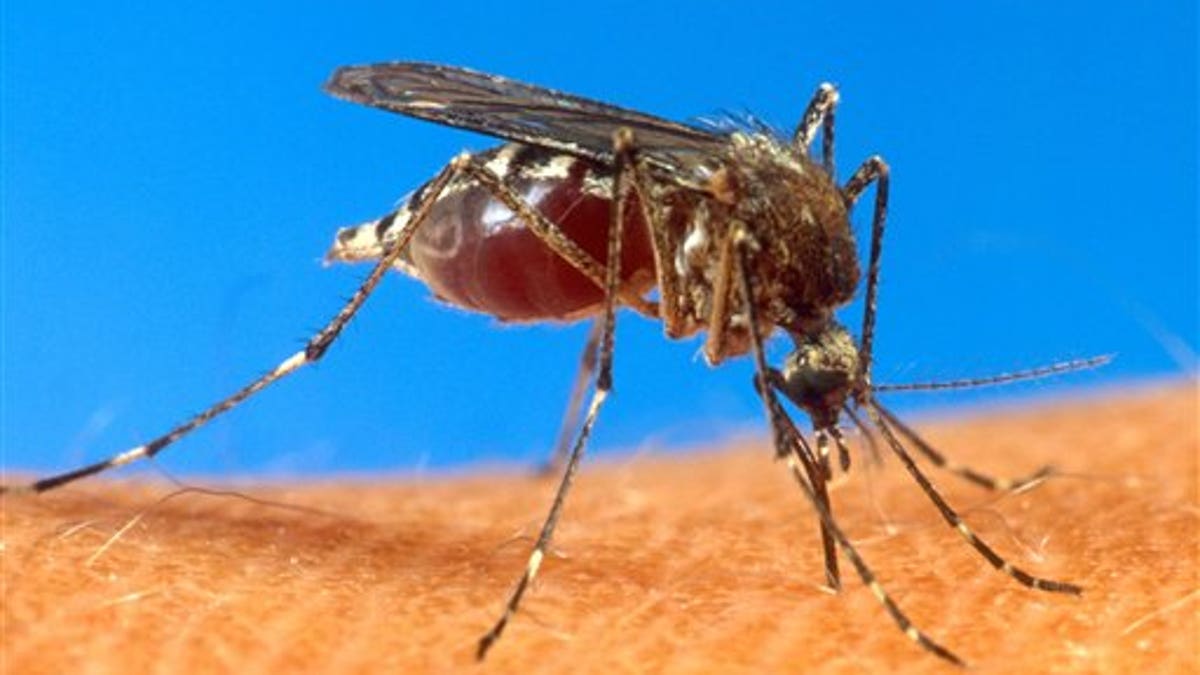
An aedes aegypti mosquito, which is linked to the chikungunya virus, is shown on human skin. (AP)
HAVANA – Two cases of the mosquito-borne virus chikungunya have been reported in Leon County, FL, both in patients that had recently traveled to Haiti.
Leon County Health Officer Claudia Blackburn told USA Today, however, that the public is not in danger because the cases didn't spread locally.
"People don’t need to worry about getting this disease here in Leon County,” she told the paper.
She added that people need to remember to cover up, use an insect repellent, cover their windows, make sure their screens are intact and drain standing water around their homes.
Chikungunya virus is spread by two mosquito species: Aedes aegypti and Aedes albopictus, both found in Florida.
According to the Duval County Health Department, the number of cases has nearly doubled in the last two weeks in Florida, but the disease has not yet been detected in local mosquito populations.
As of June 8th, the number of cases stood at 18. But as of June 14th, the number of reported cases came in at 42.
Deriving its name from an African word that loosely translates as "contorted with pain," chikungunya is rarely fatal, but those who have contracted the virus call it a miserable experience.
Its symptoms have been described as a combination of a terrible flu and a sudden case of arthritis, with searing headaches, a high fever and intense muscle and joint pain.
Cuban health authorities said on Wednesday they detected six cases of chikungunya fever, caused by a debilitating, mosquito-borne virus that is suspected of afflicting tens of thousands across the Caribbean since its arrival in the region last year.
In a statement published by Communist Party newspaper Granma and other official media, the Health Ministry said the cases were found in people who had recently traveled to Haiti and the Dominican Republic, where there have been thousands of locally transmitted cases of the virus.
Their condition was "evolving favorably."
Some Cubans make regular trips to those and other countries to import clothing and other goods for resale. Havana has also sent large contingents of medical workers to treat the poor in Haiti and elsewhere, though the Ministry said they undergo quarantine before returning.
Chikungunya, which has long been present in Africa and Asia, was first detected in the Caribbean in December.
Deriving its name from an African word that loosely translates as "contorted with pain," chikungunya is rarely fatal, but those who have contracted the virus call it a miserable experience.
Its symptoms have been described as a combination of a terrible flu and a sudden case of arthritis, with searing headaches, a high fever and intense muscle and joint pain.
Cuba is in the early part of its summer monsoon season, when mosquito-borne diseases typically spike.
As in other years, in recent weeks Cuban authorities have ramped up a campaign to send brigades of workers door-to-door fumigating houses, offices and government buildings nationwide.
"The Health System ratifies the need to intensify the vector-control fight that is being carried out in the country, for which it is essential that in every home and workplace the necessary actions are guaranteed to eliminate possible (mosquito) breeding grounds," the Ministry said in its statement.
It advised islanders traveling to other parts of the Caribbean to see a doctor upon their return and to seek immediate medical care if they experience symptoms typical of the virus.
According to a report by the Pan American Health Organization, there have been about 166,000 suspected and 4,600 confirmed cases of Chikungunya in the Caribbean as of mid-June.
Based on reporting by The Associated Press.
Follow us on twitter.com/foxnewslatino
Like us at facebook.com/foxnewslatino
